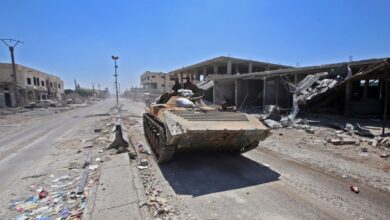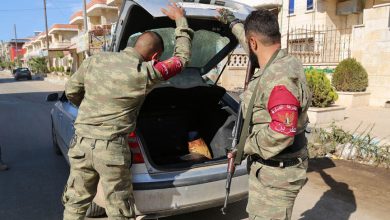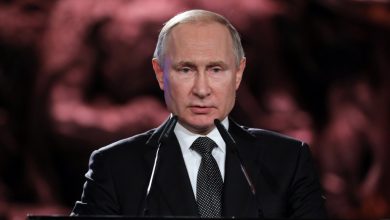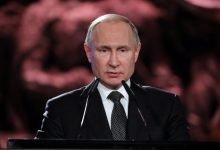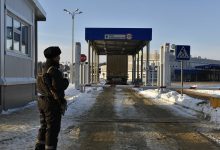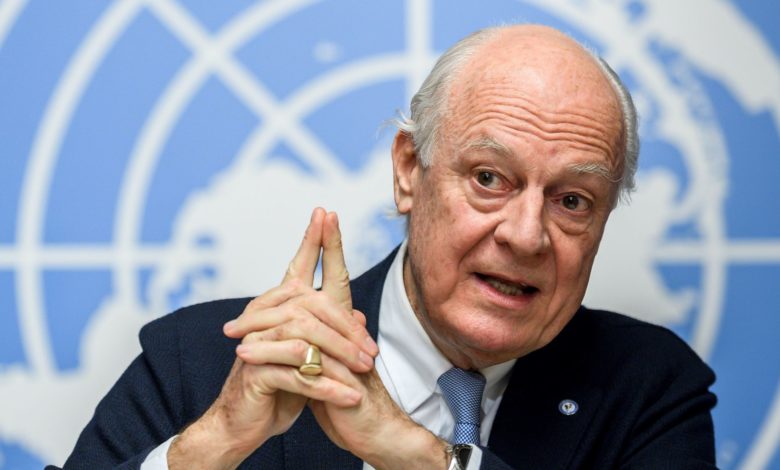
Staffan de Mistura, the former UN special envoy to Syria, has said he quit the post last year because he realised Bashar al-Assad had won the territorial civil war in Syria and he could not bring himself to shake the president’s hand.
He also said he was furious when Russia and the US reached a deal in autumn 2016, before the US election, to de-escalate the civil war by grounding the Syrian air force and separating al-Nusra forces from the Syrian opposition – a deal that fell apart after a Syrian army attack on a UN aid convoy killed more than 20 people.
He said one of the effects of the EU’s failure to address the Syrian crisis and the wave of Syrian refugees into Europe in 2015 was Britain’s Brexit vote.
De Mistura was speaking for the first time in the UK about his period as special envoy between 2014 and 2018, a period in which there were tens of thousands of deaths, a Russian military intervention and a gradual clawback of territory by Assad.
Speaking at the Aga Khan Centre in London, he said: “Why did I leave last year? Well, officially, for personal reasons. Unofficially, because I felt the war territorially was leading to an end and having really fought against what happened in Aleppo, in Idlib, in Daraya, I could not be the one that is shaking Assad’s hand and saying malesh [Arabic for don’t worry].
“I could not shave myself in the morning saying malesh. But wars are won and lost and this one territorially has been lost.”
He admitted he had not followed “the manual of the perfect mediator” as he had condemned war crimes and sieges by both sides, angering both the government and opposition. He said the UN’s interventions, including aid convoys and his personal denunciation of the destruction of Aleppo, may have saved as many as 700,000 lives. He did not regret his own interventions but said: “I reduced my space as a negotiator.”
De Mistura claimed even now Russia wanted a peace deal, as shown by the restart of UN-led talks in Geneva last week by his successor, Geir Pedersen. “The Russians have no interest, no means, no capacity of reconstructing Syria and have no intention, if they are smart, of being left with the candle in their hand that then burns their hand. They would rather pass it on to Europe who could then contribute to the reconstruction. A broken country can be a huge heritage.”
He predicted Europe would help only if there was political stability in Syria, and he said this was only achievable if there was an inclusive peace.
He claimed Russia’s foreign minister, Sergei Lavrov, and the then US secretary of state, John Kerry, in a moment of personal chemistry reached a deal in August 2016. “The Russians will have the Syrian airforce and helicopters grounded and the opposition would have to separate from [the terrorist group] al-Nusra.”
“The Russians had wanted a deal because they feared Hillary Clinton was set to become president and introduce a more muscular policy. The deal fell apart due to “spoiling events”, he said, in reference to the aid convoy attack.
Discussing the 2015 Syrian refugee crisis, De Mistura said: “Even Brexit was a collateral effect of the disappointment of some Brits that Europe was not able to handle on behalf of everyone a major crisis.”
The former US ambassador to the UN, Samantha Power, speaking separately, said David Cameron’s insistence on seeking and then failing to obtain UK parliamentary approval for airstrikes following a chemical weapons attack on the outskirts of Damascus on 21 August 2013 had led the Obama administration to abandon the plan. She described it as the “unique foresight for which he is known now – the preview of the Brexit foresight.”
“We were much closer to Obama actually ordering the strikes. We were hours from it away really,” she said.
“Then a decision was made really to give the PM his time so we have the biggest possible most legitimate coalition we can have. When that did not go through, the vulnerability of having a smaller coalition, the vulnerability of what happened to Cameron, made Obama feel he needed thicker ballast.” She said the decision was then made to seek Congressional approval for US airstrikes.
“We ended up with the rug being pulled out from under us altogether,” she said. “To pursue that Congressional authorisation without knowing whether you have the votes, I don’t think anyone can look back on that and think it is our best moment.”


